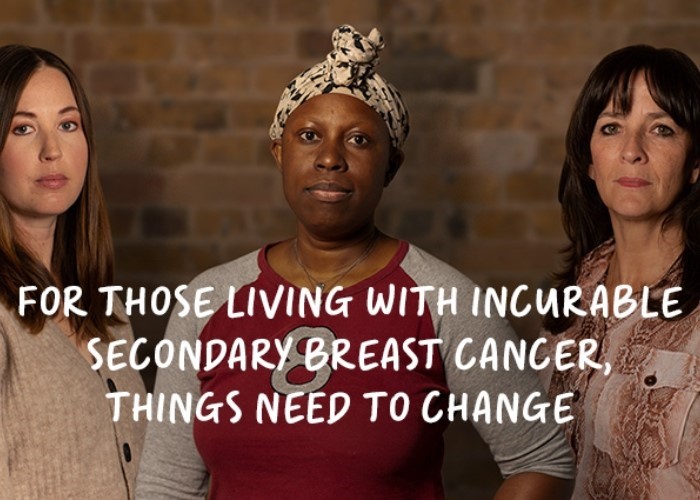A year ago, along with some of the incredible women involved in our secondary breast cancer campaign, we went to parliament to deliver a petition with more than 70,000 signatures to the Cancer Minister, Jo Churchill.
A year ago, along with some of the incredible women involved in our secondary breast cancer campaign, we went to parliament to deliver a petition with more than 70,000 signatures to the Cancer Minister, Jo Churchill.

Working through the pandemic
Our message was simple: more action was needed to improve secondary breast cancer diagnosis, treatment and care.
Shortly after the petition hand-in, the coronavirus pandemic led to significant disruption to the NHS and cancer services. Throughout the pandemic, we have continued to work with the NHS and UK governments to push for much needed improvements.
Data collection: a secondary breast cancer audit
At the moment, we still do not know how many people there are in the UK living with secondary breast cancer, or the length of survival after diagnosis or treatments.
A secondary breast cancer audit would be an important first step to make some real progress towards collecting secondary breast cancer data. It would help us to understand the experiences of people with secondary breast cancer and ensure the NHS can provide the services, treatment, and care that those with secondary breast cancer deserve.
This critical issue was raised by Craig Tracey MP, Co-Chair of the All-Party Parliamentary Group on Breast Cancer (APPGBC) during a parliament debate. In the debate, Jo Churchill offered to work with the APPGBC on a secondary breast cancer audit.
Following the debate, we worked with the APPGBC to organise a roundtable, which brought together clinicians, representatives from the pharmaceutical industry, and Claire – a passionate and dedicated secondary breast cancer campaigner and patient advocate – to make the case for an audit. We are following up with the minister and the NHS, and seeking a meeting with them both to make the case and secure an audit.
Helping GPs recognise signs and symptoms to enable faster diagnosis
It’s crucial people with secondary breast cancer are diagnosed promptly so they can begin treatment and access supportive care as quickly as possible. However, we know many people experience avoidable delays in diagnosis.
To tackle this, we’ve been working with GatewayC, a free online cancer education platform for healthcare professionals. We have provided content which will help equip GPs with the knowledge to more confidently spot cases of secondary breast cancer, leading to quicker diagnosis. We are very pleased that the course will be launched in the next few months. This is an important first step to helping primary healthcare professionals understand the signs and symptoms of secondary breast cancer.
Accessing treatments
Over the past year, we’ve highlighted the needs of secondary breast cancer patients as cancer recovery plans were developed, including recognising the importance of drug treatment for these patients.
We also raised serious concerns with the NHS and governments about coronavirus guidance suggesting how patients should be prioritised for drug treatment if this became necessary. Patients having noncurative treatment, such as those with secondary breast cancer, were generally given a lower priority than those have curative treatment.
Following this, decision-makers reiterated and stressed the importance of decisions being made on an individual basis according to the risks and benefits of treatment.
Making sure everyone is supported
We know many people with secondary breast cancer do not have access to a clinical nurse specialist (CNS), meaning they are missing out on the vital support a CNS can provide in helping them manage their diagnosis and treatment.
The NHS People Plan 2020–21 was launched in July 2020. While we were pleased to see the introduction of grants to support more nurses to become cancer nurse specialists, we were disappointed by the lack of a long-term vision and plan for the cancer workforce. Our response highlighted the need for a comprehensive strategy to recruit and train even more nurses to ensure all patients have access to the care they need.
In the autumn, we campaigned for the Comprehensive Spending Review (CSR) to commit to funding to recruit and train more NHS staff, including CNSs. Positively, the Spending Review included some additional investment in the NHS workforce, including £260 million for Health Education England (HEE), the body responsible for recruiting and training healthcare staff.
Continuing to push for change in the nations
In Wales, we have provided feedback to the Welsh Government to inform its Cancer Delivery Plan as part of our role on the Wales Cancer Alliance. Our feedback highlighted the need to identify and address gaps in services for those living with the disease.
In Scotland, despite our efforts to ensure measures on secondary breast cancer were included in the Scottish Cancer Recovery Plan, it didn’t build on the commitments included in ‘Beating Cancer: Action and Ambition’ to work with us to improve symptom awareness, data collection and care for secondary patients. We are continuing to work through the Scottish Cancer Coalition and highlight the need to prioritise measures to improve secondary breast cancer treatment and care.
Looking ahead, elections for both the Welsh Senedd and Scottish Parliament will take place in May, and we are writing to all party leaders setting out our urgent recommendations on secondary breast cancer, offering to work with the next government to implement them.
One of our first tasks after the elections will be to write to newly-elected Members of the Senedd and Members of the Scottish Parliament about the campaign and secure meetings with the relevant health ministers.
We know there is so much more to do, and improving treatment and care for people living with secondary breast cancer continues to be one of our top priorities. Sign up to our campaign updates for news on our progress and ways you can help.